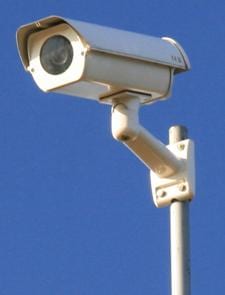It’s not known where they’re going to go, but there will soon be more surveillance cameras on the streets of Vancouver, Kelowna and Surrey.
Solicitor General John van Dongen and Attorney General Wally Oppal announced $1 million for closed circuit television (CCTV) cameras in high-crime areas Oct 27.
And that’s got members of the gay community as well as the BC Civil Liberties Association concerned.
But, the ministers say, the Office of the Information and Privacy Commissioner is being consulted to ensure that any use of the technology balances existing privacy guidelines with the broader public interest of ensuring safety in public areas.
That will include establishing clear rules to ensure information is appropriately collected, managed and protected, Oppal and van Dongen promise.
Micheal Vonn of the BC Civil Liberties Association isn’t buying any of it.
She says the situation is ripe for a Constitutional challenge.
It’s generally so-called deviant behaviour that is watched for on cameras, she points out.
“The more you fall outside the mainstream, the more you may be concerned about the surveillance,” Vonn says.
“We do not believe you waive all Constitutional rights in public places,” she adds.
Jack Herman of West Enders Against Violence Everywhere calls it an invasion of civil liberties.
“I understand it’s to help police,” he says, but “I think citizens should have a say on what is happening in our city.
“I haven’t seen any call for public input,” he notes.
But Vancouver mayor Sam Sullivan says the community will be consulted as to where cameras should be placed.
Sullivan says that consultation will be done through facilities such as the community policing centres.
Herman says that’s laughable.
“I guess if you want it to go your way, that’s who you consult,” he says. “That’s not public input; that’s on the side of the cops and enforcement.”
Herman says he’d like to see public forums held throughout the city on the issue.
Oppal and van Dongen maintain that the pilot project is to “assist the police and prosecution in bringing offenders to justice.”
“Our goal is simple: to investigate and solve more crime where it is really hitting home — urban areas where people have the right to feel safe going about their lives.”
They did not say where the cameras would be placed.
They did, however, say the cameras would not be controlled by the police.
Police would have to apply to use tapes from areas where crimes were believed to have been committed, Oppal and van Dongen say.
They say the province will work with local governments, law enforcement agencies and local Crown counsel to identify high crime locations, the best technologies to employ, and how these services can be coordinated with existing public safety measures.
Based on the results of the project, van Dongen says, the province will look at sustained funding and future commitments.
He used as an example a bus loop in Kelowna where crime was rampant.
He says installing cameras there moved crime outside of the bus loop zone, making it safe for transit users.
Asked if cameras would then be added to the area outside the loop to monitor where the crime had moved, the solicitor general said: “I don’t believe cameras everywhere is the goal or the solution. I don’t anticipate cameras all over the community.”
Sullivan says the community policing centres in the city would be involved in the camera site-selection process.
“We know from other jurisdictions’ experience with cameras that they can have a powerful crime-fighting impact,” says Sullivan.
Vonn would like to know which jurisdictions Sullivan is referring to.
She says the best example is the United Kingdom where hundreds of millions of dollars were spent to put up surveillance cameras for the same reasons.
That initiative was deemed a fiasco by the UK police earlier this year, she says.
UK authorities have some of the most extensive surveillance powers in the world.
The country has become a leader in what critics call “Big Brother” techniques ranging from secret listening devices and upwards of 4.3 million closed-circuit cameras in operation.
UK officials say they want to increase that capacity to include facial recognition technology in anticipation of their 2012 Olympic Games, two years after Vancouver is set to host its own Winter Games.
A joint press release from BC’s Ministries of the Attorney General and Public Safety and Solicitor General says deploying CCT cameras “was one of the key recommendations made by the Progress Board in their November 2006 report, Reducing Crime and Improving Criminal Justice in British Columbia.”
That is not quite true.
The report (available at http://www.bcprogressboard.com/2006Report/CrimeReport/Crime_Final.pdf) recommends addressing (among other things) reviewing the organization and functions of law enforcement agencies in the province.
In that section, the use of CCTV is only mentioned as a tool used by partnerships between police and private security agencies in the United States. The use of cameras is not a specific recommendation.
That brief section in an overall recommendation notwithstanding, Vonn says Monday’s announcement caught BC Civil Liberties completely off guard.
CCTV has been used extensively in the private sector such as banks and retail outlets, and other jurisdictions have successfully used it to help solve many high-profile crimes.

 Why you can trust Xtra
Why you can trust Xtra


